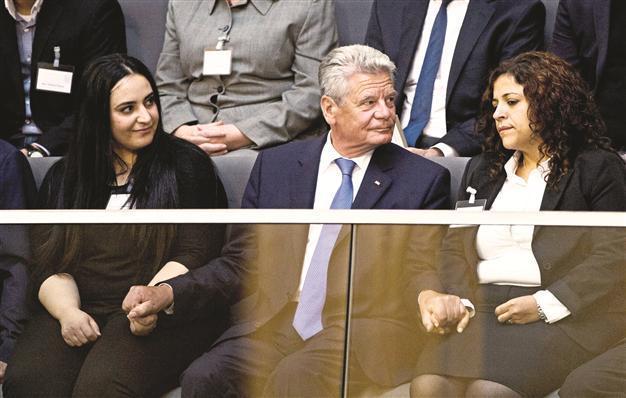Bundestag honors neo-Nazi cell victims
BERLIN

German President Joachim Gauck (C) holds the hands of unidentified relatives of NSU victims during a session of the Bundestag lower house of parliament dedicated to a probe into the handling by German security agencies of the NSU group, in Berlin on September 2, 2013. AFP Photo
The president of the German Bundestag, the lower house of the parliament, has apologized to relatives of those murdered by a neo-Nazi group during a session attended by the German president and Turkey’s ambassador to Berlin.The Bundestag adopted Sept. 2 a parliamentary commission report stating German security forces shamefully neglected the threat of the far right and bungled investigations. The report came after a 19-month inquiry into the National Socialist Underground (NSU) cell, whose chance discovery in late 2011 scandalized Germany and forced authorities to recognize the far right was more brutal than previously thought. Parliament’s investigation revealed mistakes at all levels, by the patchwork of state and national police, prosecutors and intelligence agencies, as well as a systematic failure to consider racist motives behind the shootings of eight Turks and a Greek between 2000 and 2007, later attributed to the NSU.
The failure of German police and intelligence services to trace a murder series between 2000 and 2007 to a secret neo-Nazi cell was a “shameful defeat,” according to a cross-party inquiry report adopted without abstention or dissent by the Bundestag.
Bundestag President Norbert Lammert apologized to relatives of those murdered, who were initially and falsely treated as suspects by investigators at crime scenes as far apart as Cologne, Nuremburg and Rostock, Deutsche Welle reported.
German President Joachim Gauck and Turkey’s ambassador Hüseyin Avni Karslıoğlu attended the session with the relatives of those murdered. “Such a massive administrative failure, that we ended up determining, should never repeat itself,” the head of the commission, Sebastian Edathy, said, referring to investigators’ initial false theory that the fatal shootings stemmed from feuds within Turkish circles.
The top representative of Chancellor Angela Merkel’s conservatives in the committee, Clemens Binniger, drew praise from opposition socialist counterpart Eva Högl, according to Deutsche Welle’s report. She said he had prevailed against “especially strong resistance” within his own party circles to official disclosures. “For that, many thanks. That must be said,” Högl told Binniger. Binniger said law enforcement authorities had failed to cooperate while “colossally and tragically” underestimating far-right extremism.
Liberal Free Democrat Hartfrid Wolff, another committee member, said the string of investigative failures had resulted in a “grave loss” of public trust in the capability of the security services.
“Why were files erased?” Wolff asked while demanding reforms of the police and intelligence services, including better parliamentary supervision.
The NSU is now considered to have been a terrorist group, and its surviving member Beate Zschaepe is on trial. She is accused of lending vital support to the group’s two gunmen, who died in an apparent murder-suicide in 2011.
“We no longer need some of the intelligence services,” Wolff added, referring to Germany’s complicated swathe of agencies at the federal level and in the country’s 16 states.
















